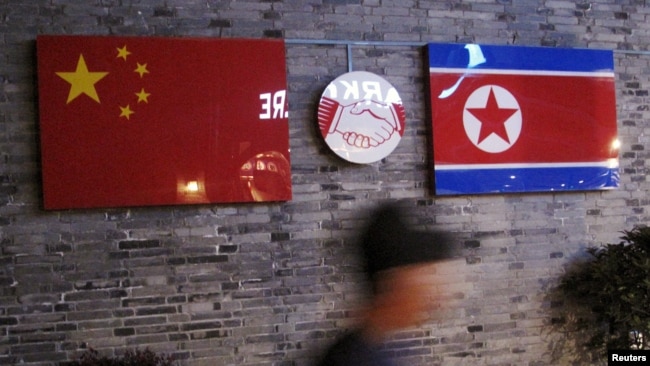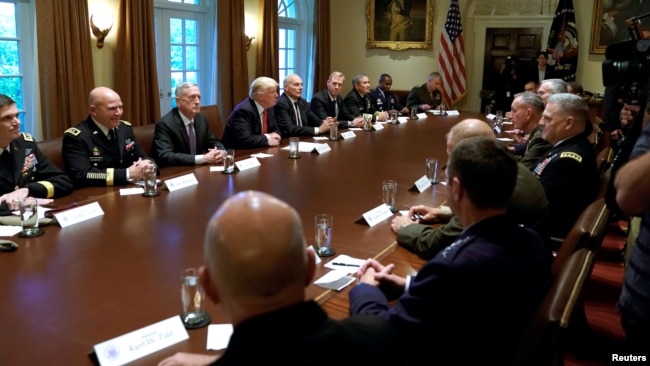By Natalie Liu
 Communist supremos
Communist supremos
WASHINGTON — A longtime editor of a magazine that specializes in global power politics recently put forth a scenario where China would stage a takeover of North Korea, giving Washington and the rest of the world a nuclear weapons-free Korean Peninsula.
Bill Emmott, the former editor-in-chief of The Economist magazine, said such a move by China would not only gain Beijing a solid foothold on the Korean Peninsula, but also the opportunity to strengthen its own geopolitical position, enhance its global power status, perhaps even the ability to claim the reputation of a peacemaker.
That is the “least bad military option” vis a vis North Korea, Emmott said, in that it would avoid subjecting U.S. allies in Asia, including South Korea and Japan, to North Korea’s retaliation that could potentially devastate large parts of South Korea.
China’s takeover of North Korea, as Emmott sees it, would put North Korea “where the country’s post-Korean War history suggests it belongs: under a Chinese nuclear umbrella, benefiting from a credible security guarantee.”
He also said he sees incentives for North Koreans to go along with the plan: “Whereas a nuclear exchange with the U.S. would mean devastation, submission to China would promise survival, and presumably a degree of continued autonomy.”
Emmott said this strategy could win over a majority of North Korea’s military, “except those closest to Kim.”

Bill Emmott, the former editor-in-chief of The Economist magazine, said such a move by China would not only gain Beijing a solid foothold on the Korean Peninsula, but also the opportunity to strengthen its own geopolitical position, enhance its global power status, perhaps even the ability to claim the reputation of a peacemaker.
That is the “least bad military option” vis a vis North Korea, Emmott said, in that it would avoid subjecting U.S. allies in Asia, including South Korea and Japan, to North Korea’s retaliation that could potentially devastate large parts of South Korea.
China’s takeover of North Korea, as Emmott sees it, would put North Korea “where the country’s post-Korean War history suggests it belongs: under a Chinese nuclear umbrella, benefiting from a credible security guarantee.”
He also said he sees incentives for North Koreans to go along with the plan: “Whereas a nuclear exchange with the U.S. would mean devastation, submission to China would promise survival, and presumably a degree of continued autonomy.”
Emmott said this strategy could win over a majority of North Korea’s military, “except those closest to Kim.”

Flags of China and North Korea are seen outside the closed Ryugyong Korean Restaurant in Ningbo, Zhejiang province, China, April 12, 2016.
Biggest winner: China
The biggest winner from such a takeover, however, would be China, he said.
“Not only control of what happens on the Korean Peninsula, where it presumably would be able to establish military bases, but also regional gratitude for having prevented a catastrophic war,” Emmott said.
In addition, a successful military campaign would bring China “huge reserves of soft power,” such as the ability to influence future events in the region and worldwide, he said.
Washington’s desire to ensure that North Korea does not possess nuclear weapons presents China, which many argue is America’s foremost geopolitical rival, the best opportunity to achieve greater strategic and power parity with the U.S. in the Asia-Pacific region, while removing, in Emmott’s words, “a source of instability that threatens both Washington and Beijing.”
The downside of this idea being carried out is the loss of status by the United States, as well as freedoms, in Asia, Emmott told VOA.
The Fate of the West: The Battle to Save the World’s Most Successful Political Idea, published earlier this year and written by Emmott, is among a rising number of books and articles expressing concerns of the rise of illiberalism in the world.
China’s enlarged footprint, so long as China remains a communist regime, remains a serious source of concern for democratic societies, as well as for those in and outside of China working to change the country.
 U.S. President Donald Trump participates in a briefing with senior military leaders at the White House in Washington, Oct. 5, 2017. Hours later, he called the evening the "calm before the storm."
U.S. President Donald Trump participates in a briefing with senior military leaders at the White House in Washington, Oct. 5, 2017. Hours later, he called the evening the "calm before the storm."
Curious remark
In Washington, U.S. President Donald Trump on Thursday hosted a gathering of top military leaders and their spouses at the White House, describing the event as “the calm before the storm.”
Biggest winner: China
The biggest winner from such a takeover, however, would be China, he said.
“Not only control of what happens on the Korean Peninsula, where it presumably would be able to establish military bases, but also regional gratitude for having prevented a catastrophic war,” Emmott said.
In addition, a successful military campaign would bring China “huge reserves of soft power,” such as the ability to influence future events in the region and worldwide, he said.
Washington’s desire to ensure that North Korea does not possess nuclear weapons presents China, which many argue is America’s foremost geopolitical rival, the best opportunity to achieve greater strategic and power parity with the U.S. in the Asia-Pacific region, while removing, in Emmott’s words, “a source of instability that threatens both Washington and Beijing.”
The downside of this idea being carried out is the loss of status by the United States, as well as freedoms, in Asia, Emmott told VOA.
The Fate of the West: The Battle to Save the World’s Most Successful Political Idea, published earlier this year and written by Emmott, is among a rising number of books and articles expressing concerns of the rise of illiberalism in the world.
China’s enlarged footprint, so long as China remains a communist regime, remains a serious source of concern for democratic societies, as well as for those in and outside of China working to change the country.
 U.S. President Donald Trump participates in a briefing with senior military leaders at the White House in Washington, Oct. 5, 2017. Hours later, he called the evening the "calm before the storm."
U.S. President Donald Trump participates in a briefing with senior military leaders at the White House in Washington, Oct. 5, 2017. Hours later, he called the evening the "calm before the storm."Curious remark
In Washington, U.S. President Donald Trump on Thursday hosted a gathering of top military leaders and their spouses at the White House, describing the event as “the calm before the storm.”
When reporters asked the president to elaborate on “the storm,” he simply said: “you’ll find out.”
Trump was asked several times Friday to clarify the remark or acknowledge if it was in regards to North Korea, but he simply stuck with his “you’ll find out.”
Trump’s former adviser, Steve Bannon, had said in an interview before he left his White House position that because of South Korea’s proximity to North Korea, a military option for Washington doesn’t exist.
“Until somebody solves the part of the equation that shows me that 10 million people in Seoul don’t die in the first 30 minutes from conventional weapons, I don’t know what you’re talking about, there’s no military solution here,” Bannon said.
Trump was asked several times Friday to clarify the remark or acknowledge if it was in regards to North Korea, but he simply stuck with his “you’ll find out.”
Trump’s former adviser, Steve Bannon, had said in an interview before he left his White House position that because of South Korea’s proximity to North Korea, a military option for Washington doesn’t exist.
“Until somebody solves the part of the equation that shows me that 10 million people in Seoul don’t die in the first 30 minutes from conventional weapons, I don’t know what you’re talking about, there’s no military solution here,” Bannon said.
“They got us.”
While current U.S. officials have consistently not ruled out a military option against North Korea, Washington is also exploring diplomatic solutions.
While current U.S. officials have consistently not ruled out a military option against North Korea, Washington is also exploring diplomatic solutions.
Aucun commentaire:
Enregistrer un commentaire